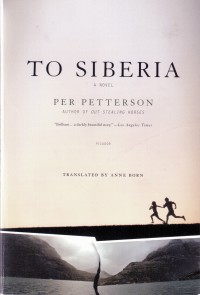To Siberia by Per Petterson (1996. 1998 Translation. Picador. ISBN 978-0-312-42899-0)
On the way home from school I walk right behind Lone and mimic the way she moves. She minces along. I go on doing that as long as it is fun, and Lone never once looks back. She lives in a big house…almost at Frydenstrand. I don’t go as far as that, but in the same direction. We never walk together. Lone is upper class and must not be seen in my company. The feeling is mutual. But as I am about to turn up Asylgate, she does turn around. She stares at me with eyes full of hate, takes hold of her scarf and wrenches it around so the knot is at her nape and hitches it up until it’s really tight, sticks out her tongue, and squints at me. At once I start to run, hit her with my shoulder, and knock her backward into a snow drift. I give her a thorough ducking. She may be the headmaster’s daughter, but no one makes game of me. No one.
In this brief, almost novella-sized poetic novel, Petterson, whose Out Stealing Horses (see my review in the Review Archives) became an international best seller, paints a picture of pre and post WWII Denmark and Norway that is the literary equivalent to an Edvard Munch painting: Sparse, dark, bitter, yet compelling. To Siberia is really a collection of interlocked vignettes rather than a fully realized novel: The storyline skips and meanders and moseys around, following the young female protagonist and her brother through a series of scenes and encounters. But this lack of continuity and structure is not a deficit. Indeed, the wayward path of story in this book is one of its distinct charms. The Scandinavian lilt and lyric of the author’s prose reminds one of an old Norse saga or of some long forgotten folk song. Sea spray and snow and gray skies and bone chilling cold are omnipresent throughout this story of two siblings growing up in chaotic times. There are hints of holocaust, war, death, sabotage, sex, forbidden love, and incest sewn within the fabric of Petterson’s poetry, all of which enable the fully realized characters of the tale to grapple with the emotional upheaval of small countries dragged into a world wide conflagration. A simple yet powerful piece of writing.
4 and 1/2 stars out of 5.



